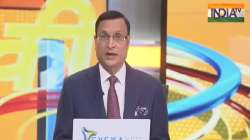Opinion | India parades defence indigenization
Gone are the days when Indian armed forces used to be dependent on import of all military equipment. Prime Minister Narendra Modi's government has laid full emphasis on the development of indigenous defence sector and these equipment are proof of that initiative.

India showcased its military might at the Republic Day parade on Thursday in Delhi. For the first time, indigenous 105 mm field guns fired a 21-gun salute, replacing vintage British 25-pounder guns on Kartavya Path (formerly Raj Path). This was soon followed by a display of 'swadeshi' military muscle in the presence of a large crowd that included foreign diplomats and other dignitaries, with chief guest Egyptian President Abdel Fattah el-Sisi watching.
Among the Made In India military equipment displayed was the recently deployed Light Combat Helicopter Prachanda. It led a formation of US-built Apache choppers and two indigenous ALH MK-IV choppers in arrow style. The first indigenous Akash air defence system, main battle tank Arjun, that has a speed of 70 kmph, equipped with a 120 mm main rifled gun, 7.62 mm machine gun and an indigenous anti-aircraft gun, rolled on at the parade.
The fire-and-forget Nag anti-tank guided missile, with an effective range of 5 km, was also displayed. The K-9 Vajra-T self-propelled howitzer built by India's Larsen and Toubro company with South Korean technology was also one of the major attractions of the parade.
The Brahmos supersonic high-precision cruise missile was showcased by 861 missile regiment, while the first indigenously developed Akash system was displayed at the parade by 27 Air Defence Missile regiment. Akash weapon system can keep surveillance over 150 km of air space and can shoot down any hostile aircraft within a range of 25 km. The Made In India 8x8 amphibious infantry armoured vehicle was also displayed at the parade.
Gone are the days when Indian armed forces used to be dependent on import of all military equipment. Prime Minister Narendra Modi's government has laid full emphasis on the development of indigenous defence sector and these equipment are proof of that initiative.
In the past, arms import was deemed necessary in order to beef up security on our borders. Gradually, the government decided to scale down import of military equipment and start manufacturing them indigenously. This has saved major outgo of foreign exchange.
Secondly, purchase of defence equipment led to allegations of corruption in arms deals. At that time, nobody thought that these military equipment can be built in India. Narendra Modi thought about this and the result is there for all to see. This is just the beginning. The Defence Industrial Corridor is coming up near Jhansi, UP.
India is still the world's second biggest arms importer. Over 60 per cent of its military hardware is on Russian origin and the rest is sourced from Israeli, US and France. Presently, our armed forces have a mix of Russian tanks, French fighter aircraft and American transport aircraft and choppers. But things are changing fast and stress is being laid on indigenous manufacturing. The K-9 Vajra-T howitzer and Prachanda light combat helicopters are main examples.
Modi government has set the first milestone for 2025, by which time Rs 1.75 lakh crore worth military equipment will be produced and Indian companies will make arms export worth Rs 35,000 crore. This fiscal year, Indian arms export is expected to be in the range of Rs 16-17,000 crore.
Here we should bear one thing in mind. There are countries whose economies depend heavily on export of military equipment, warships and aircraft to countries like India. These countries will never want India to go in for massive defence indigenization. There are challenges ahead, and we should hope for the day when India will not only manufacture all the ships, aircraft and missiles that it wants, but also export them.
Aaj Ki Baat: Monday to Friday, 9:00 pm
India's Number One and the most followed Super Prime Time News Show 'Aaj Ki Baat- Rajat Sharma Ke Saath' was launched just before the 2014 General Elections. Since its inception, the show is redefining India's super-prime time and is numerically far ahead of its contemporaries.